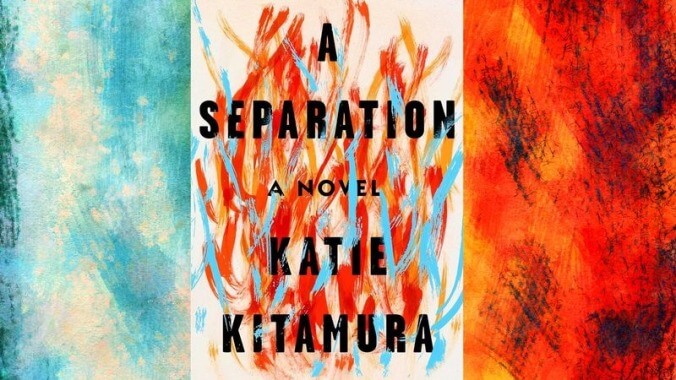A Separation is a quietly devastating depiction of modern loss and alienation

To say the nameless narrator of A Separation isn’t one for emotional confessions would be to understate the case. Chapter after chapter, the reader waits for backstory to be revealed, for opinions to be laid out, for some easy connection to the woman who is relaying the details of her circumstances with such low-key detachment. But those expectations remain unfulfilled. When the emotional truths begin to unveil themselves—and they eventually do, with the quiet intensity of a tornado’s eye—it’s startling, as though the clear-eyed analysis and deeply felt honesty of the prose snuck in the back door, and only retroactively made itself known. This is a book of understated revelations, full of stark language that nonetheless demurs at every opportunity to make a bold gesture or proclaim a more risky perspective.
But the alienation of the novel isn’t unrecognizable, or jarring. Katie Kitamura has crafted a protagonist who prefers to stand on the sidelines of her own life, as though surprised anybody could be bothered to invest themselves so fully in the practice of living. The story begins with the makings of a mystery, rendered in spare prose that recalls the controlled burn of old-school detective noir. The narrator is contacted by Isabella, her mother-in-law, who informs her that Christopher, the narrator’s husband, has gone to Italy and vanished while staying at a posh hotel in the remote countryside. Unbeknownst to Isabella, Christopher and the woman have recently separated—Christopher had asked to keep the split under wraps for the time being—and so she agrees to go to Greece, at Isabella’s urging, and track down her husband.
But this isn’t a pulp thriller, and the narrator isn’t Sam Spade. Rather, she goes to Greece with the intention of asking for a divorce. The bulk of the novel plays out over the course of several days, as she checks in to the place Christopher is staying, and waits for her estranged husband to appear. She doesn’t offer up details of their marriage, at least not initially, and in the early going, the only things we know are what she’s encountering in the moment, as she speaks to Isabella, arrives at the sparsely populated accommodations, and takes stock of her situation. The finely observed recollections of her life begin almost as afterthoughts. It’s nearly one-fourth of the way into the book, in describing her new living situation in New York with a loving but insecure man, Yvan, that we get this minor-key glimpse into the nature of her failed marriage: “Although it was much smaller than Christopher’s apartment, as a couple we seemed to require less; it was discord that required all that space.”
As the question of Christopher’s whereabouts starts to take on an air of worry, she begins to peel back the layers of their claustrophobic existence, though always one step removed, as though she were having an out-of-body experience looking back on her life. And that’s the real power of Kitamura’s writing: Her protagonist is less an unreliable narrator than unwilling one. Her thoughts spill out painful truths and keen insight almost by accident, like she prefers the role of play-by-play announcer, rather than color commentator or—god forbid—active participant. (Her job, a translator of books, is in keeping with this desire to keep her own contributions invisible; she worries that, in her professional life, she might unconsciously shape others’ texts without intending to.) Underlying it all is her sense of disconnect, a feeling that she is not herself. She thinks of it as stemming from the pretense of playing the happily married woman—or at least a non-separated one—but as the mystery is resolved in the back half of the novel, it’s clear the gap between her self-image and her outer-directed one has been riven for some time.
With that sense of alienation from herself comes a deep well of penetrating analyses of human behavior, delivered in almost aphoristic fashion at times. And those understated observations end up making a character who initially seems so at odds with a contemporary culture of selfies and social media into a repository for the universal fear of emotional pain. She’s capable of turning her sharp, near-clinical powers of assessment on everyone except herself, substituting others’ passions and weaknesses for her own. It’s as though the character saw the potential for sadness, and thought it best to avoid such entanglements, her own failed relationship the unspoken totem lording over the rest of her life. “People were capable of living their lives in a state of perpetual disappointment, there were plenty of people who did not marry the person they hoped to marry, much less live the life they hoped to live, other people invented new dreams to replace the old ones, finding fresh reasons for discontent.” If this were Fight Club, she would be Jack’s sense of existential futility.
The buried grief and emotional distance that first seem so off-putting are what ends up lending A Separation its haunting force. Much like the failed marriage and missing husband that drive the narrative, the lack of emotional intimacy between narrator and reader ends up forcing one to step back from the proceedings, to see them as the protagonist does: a series of frustrated hopes that have somehow spiraled into a situation no one ever expects to face. By turning the commonplace event of a breakup into the means of diagnosing something honest and true about how we live now, Kitamura achieves a much more timeless feat. She has made emotional distance painfully close, and alienation—that all-too-common state, that antonym of “to marry”—of a piece with self-knowledge.
Purchase A Separation here, which helps support The A.V. Club.